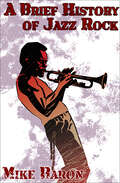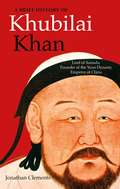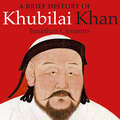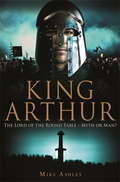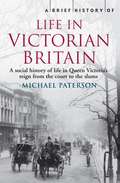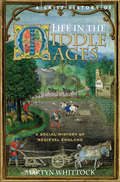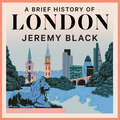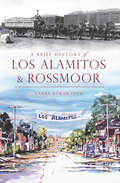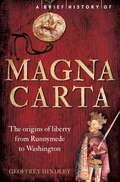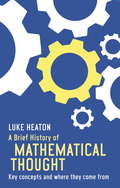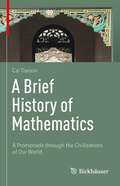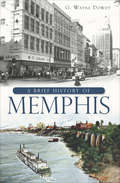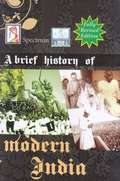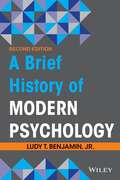- Table View
- List View
A Brief History of Jazz Rock
by Mike BaronJazz rock flourished from 1968 to 1974, offering a distinctively cool and innovative hybrid sound that captivated a generation—and beyond. Superstar bands like Blood, Sweat and Tears and Chicago have earned their place in popular consciousness, but the movement included many other powerful, innovative groups such as Tower of Power and Malo. Author Mike Baron explores the history of this music fusion, its rise and fall in popularity. He offers highlights—and his own unique insights from a front-row seat in jazz rock—into what made the era so special. A Brief History of Jazz Rock is a sax-meets-Strat bible that dares to inspire a Renaissance—to cultivate a new generation of musicians who might mix brass with bass, and help return forgotten bands like If and Dreams to their place on the main stage.
A Brief History of Khubilai Khan: Lord of Xanadu, Founder of the Yuan Dynasty, Emperor of China
by Jonathan ClementsHis grandfather was the bloodthirsty Mongol leader Genghis Khan, his mother a Christian princess. Groomed from childhood for a position of authority, Khubilai snatched the position of Great Khan, becoming the overlord of a Mongol federation that stretched from the Balkans to the Korean coastline. His armies conquered the Asian kingdom of Dali and brought down the last defenders of imperial China.Khubilai Khan presided over a glorious Asian renaissance, attracting emissaries from all across the continent, and opening his civil service to 'men with coloured eyes' - administrators from the far west. His life and times encompassed the legends of Prester John, the pinnacle of the samurai (and, indeed, the Mongols), and the travels of Marco Polo.
A Brief History of Khubilai Khan: Lord of Xanadu, Founder of the Yuan Dynasty, Emperor of China (Brief Histories)
by Jonathan ClementsHis grandfather was the bloodthirsty Mongol leader Genghis Khan, his mother a Christian princess. Groomed from childhood for a position of authority, Khubilai snatched the position of Great Khan, becoming the overlord of a Mongol federation that stretched from the Balkans to the Korean coast. His armies conquered the Asian kingdom of Dali and brought down the last defenders of imperial China.Khubilai Khan presided over a glorious Asian renaissance, attracting emissaries from all across the continent, and opening his civil service to 'men with coloured eyes' - administrators from the far west. His reign began the glorious Yuan dynasty that ruled over China for only ninety years, but had a profound impact on Asian history, from international trade to cultural revolution. Jonathan Clements's insightful biography into the life and times of one of China's greatest leaders is a fascinating introduction to an important era, uncovering the man behind Marco Polo's mythic portrait.
A Brief History of Khubilai Khan: Lord of Xanadu, Founder of the Yuan Dynasty, Emperor of China (Brief Histories)
by Jonathan ClementsHis grandfather was the bloodthirsty Mongol leader Genghis Khan, his mother a Christian princess. Groomed from childhood for a position of authority, Khubilai snatched the position of Great Khan, becoming the overlord of a Mongol federation that stretched from the Balkans to the Korean coast. His armies conquered the Asian kingdom of Dali and brought down the last defenders of imperial China.Khubilai Khan presided over a glorious Asian renaissance, attracting emissaries from all across the continent, and opening his civil service to 'men with coloured eyes' - administrators from the far west. His reign began the glorious Yuan dynasty that ruled over China for only ninety years, but had a profound impact on Asian history, from international trade to cultural revolution. Jonathan Clements's insightful biography into the life and times of one of China's greatest leaders is a fascinating introduction to an important era, uncovering the man behind Marco Polo's mythic portrait.
A Brief History of King Arthur
by Mike AshleyWho was the real King Arthur? What do the historical documents tell us about the Knight of the Round Temple? It is just a chivalric fantasy? The story of Arthur has been handed down to us by Medieval poets and legends - but what if he actually existed and was in fact a great king in the early years of Britain's story. Mike Ashley visits the source material and uncovers unexpected new insights into the legend: there is clear evidence that the Arthurian legends arose from the exploits of not just one man, but at least three originating in Wales, Scotland and Brittany. The true historical Arthur really existed and is distantly related to the present royal family.
A Brief History of King Arthur (Brief Histories)
by Mike AshleyWho was the real King Arthur? What do the historical documents tell us about the Knight of the Round Temple? It is just a chivalric fantasy? The story of Arthur has been handed down to us by Medieval poets and legends - but what if he actually existed and was in fact a great king in the early years of Britain's story. Mike Ashley visits the source material and uncovers unexpected new insights into the legend: there is clear evidence that the Arthurian legends arose from the exploits of not just one man, but at least three originating in Wales, Scotland and Brittany. The true historical Arthur really existed and is distantly related to the present royal family.
A Brief History of Life in Victorian Britain
by Michael PatersonThe Victorian era has dominated the popular imagination like no other period, but these myths and stories also give a very distorted view of the 19th century. The early Victorians were much stranger that we usually imagine, and their world would have felt very different from our own and it was only during the long reign of the Queen that a modern society emerged in unexpected ways. Using character portraits, events, and key moments Paterson brings the real life of Victorian Britain alive - from the lifestyles of the aristocrats to the lowest ranks of the London slums. This includes the right way to use a fan, why morning visits were conducted in the afternoon, what the Victorian family ate and how they enjoyed their free time, as well as the Victorian legacy today - convenience food, coffee bars, window shopping, mass media, and celebrity culture.Praise for Dicken's London:Out of the babble of voices, Michael Paterson has been able to extract the essence of London itself. Read this book and re-enter the labyrinth of a now-ancient city.' Peter Ackroyd
A Brief History of Life in Victorian Britain (Brief Histories)
by Michael PatersonThe Victorian era has dominated the popular imagination like no other period, but these myths and stories also give a very distorted view of the 19th century. The early Victorians were much stranger that we usually imagine, and their world would have felt very different from our own and it was only during the long reign of the Queen that a modern society emerged in unexpected ways. Using character portraits, events, and key moments Paterson brings the real life of Victorian Britain alive - from the lifestyles of the aristocrats to the lowest ranks of the London slums. This includes the right way to use a fan, why morning visits were conducted in the afternoon, what the Victorian family ate and how they enjoyed their free time, as well as the Victorian legacy today - convenience food, coffee bars, window shopping, mass media, and celebrity culture.Praise for Dicken's London:Out of the babble of voices, Michael Paterson has been able to extract the essence of London itself. Read this book and re-enter the labyrinth of a now-ancient city.' Peter Ackroyd
A Brief History of Life in the Middle Ages
by Martyn WhittockUsing wide-ranging evidence, Martyn Whittock shines a light on Britain in the Middle Ages, bringing it vividly to life. Thus we glimpse 11th century rural society through a conversation between a ploughman and his master.The life of Dick Whittington illuminates the rise of the urban elite. The stories of Roger 'the Raker' who drowned in his own sewage, a 'merman' imprisoned in Orford Castle and the sufferings of the Jews of Bristol reveal the extraordinary diversity of medieval society. Through these characters and events - and using the latest discoveries and research - the dynamic and engaging panorama of medieval England is revealed.Interesting facts include:When the life expectancy for women dropped to 26 years in Sierra Leone in 2002, following a catastrophic civil war, it was one year longer than the estimate for early medieval women.So great was the extent of church construction in the thirteenth century that it has been calculated it was the equivalent, in modern terms, of every family in England paying £500 every year, for the whole century!Murder rates for East Anglia, in the fourteenth century, were comparable with those of modern New York. For England generally the homicide rate was far higher than that of the urban USA today.
A Brief History of Life in the Middle Ages (Brief Histories)
by Martyn WhittockUsing wide-ranging evidence, Martyn Whittock shines a light on Britain in the Middle Ages, bringing it vividly to life in this fascinating new portrait that brings together the everyday and the extraordinary.Thus we glimpse 11th-century rural society through a conversation between a ploughman and his master.The life of Dick Whittington illuminates the rise of the urban elite. The stories of Roger 'the Raker' who drowned in his own sewage, a 'merman' imprisoned in Orford Castle and the sufferings of the Jews of Bristol reveal the extraordinary diversity of medieval society. Through these characters and events - and using the latest discoveries and research - the dynamic and engaging panorama of medieval England is revealed.
A Brief History of London (Brief Histories)
by Jeremy BlackAs the United Kingdom left the European Union, during a period of international and domestic turmoil, London found itself at a turning point. This critical moment presents an opportunity to look back, with a distinctive perspective, a focus on London in its national and, perhaps even more importantly, its international contexts, rather than on the city itself in isolation. It is the interactions of London that Black considers, and he does so in order to address the question as to why London became the foremost international city, how it sustained that position, and what its future holds. The book is as much about economics and culture as it is about politics and society. It deals with migration, communications, empire and cultural energy, rather than the mechanisms of parish vestries. London's earlier period is covered, but the principal focus is on the last half millennium, the period during which London became a major trader with the trans-oceanic world, and the ruler of trans-oceanic colonies, while the English language became an increasingly important cultural medium, one centred on London.The book includes plentiful literary references, quotations from visitors, and boxes covering discrete topics, such as Jack the Ripper.
A Brief History of London (Brief Histories)
by Jeremy BlackAs the United Kingdom left the European Union, during a period of international and domestic turmoil, London found itself at a turning point. This critical moment presents an opportunity to look back, with a distinctive perspective, a focus on London in its national and, perhaps even more importantly, its international contexts, rather than on the city itself in isolation. It is the interactions of London that Black considers, and he does so in order to address the question as to why London became the foremost international city, how it sustained that position, and what its future holds. The book is as much about economics and culture as it is about politics and society. It deals with migration, communications, empire and cultural energy, rather than the mechanisms of parish vestries. London's earlier period is covered, but the principal focus is on the last half millennium, the period during which London became a major trader with the trans-oceanic world, and the ruler of trans-oceanic colonies, while the English language became an increasingly important cultural medium, one centred on London.The book includes plentiful literary references, quotations from visitors, and boxes covering discrete topics, such as Jack the Ripper.
A Brief History of London (Brief Histories)
by Jeremy BlackAs the United Kingdom left the European Union, during a period of international and domestic turmoil, London found itself at a turning point. This critical moment presents an opportunity to look back, with a distinctive perspective, a focus on London in its national and, perhaps even more importantly, its international contexts, rather than on the city itself in isolation. It is the interactions of London that Black considers, and he does so in order to address the question as to why London became the foremost international city, how it sustained that position, and what its future holds. The book is as much about economics and culture as it is about politics and society. It deals with migration, communications, empire and cultural energy, rather than the mechanisms of parish vestries. London's earlier period is covered, but the principal focus is on the last half millennium, the period during which London became a major trader with the trans-oceanic world, and the ruler of trans-oceanic colonies, while the English language became an increasingly important cultural medium, one centred on London.The book includes plentiful literary references, quotations from visitors, and boxes covering discrete topics, such as Jack the Ripper.
A Brief History of Los Alamitos-Rossmoor
by Larry StrawtherThe city of Los Alamitos and the contiguous, unincorporated community of Rossmoor exemplify small-town America amid the populous western Orange County sprawl. Their tree-lined streets, well-kept homes and first-rate schools are reflected in Rossmoor's selection as the No. 1 suburb in California (and No. 9 nationwide) in a 2012 study by Coldwell Banker Realty. The evolution of Los Alamitos from cattle ranches and sugar beet factory town to World War II military town and ultimately into residential neighborhoods took a century. Meanwhile, the planned "walled 'city' of Rossmoor" was created between 1955 and 1961. Despite annexation talk, Rossmoor and "Los Al" coexist apart together, so to speak, on Long Beach's outskirts. Author Larry Strawther traces the histories of these interdependent sister communities, which epitomize the reality in the legend of the Orange County lifestyle.
A Brief History of Magna Carta, 2nd Edition: The Origins of Liberty from Runnymede to Washington
by Geoffrey Hindley2015 marks the 800th anniversary of the signing of Magna Carta, the influence of which is still felt today around the world. In 1215 the barons of England forced King John to sign a revolutionary document which would change the political landscape not only of thirteenth-century Britain, but of the modern world. Magna Carta was the forerunner of the constitution that limited the powers of the crown and its echoes can be found in the seventeenth-century Civil Wars, the struggles for American Independence, the work of Thomas Paine and in the bedrock constitutional legislation of just about every democratic country today. As civil Liberties and the rule of law are increasingly brought into question throughout the world, leading medieval historian Geoffrey Hindley breathes vivid life into the story behind the signing of Magna Carta, and reveals the undiminished significance of this ancient document in today?s world.
A Brief History of Magna Carta, 2nd Edition: The Origins of Liberty from Runnymede to Washington (Brief Histories)
by Geoffrey Hindley2015 marks the 800th anniversary of the signing of Magna Carta, the influence of which is still felt today around the world. In 1215 the barons of England forced King John to sign a revolutionary document which would change the political landscape not only of thirteenth-century Britain, but of the modern world. Magna Carta was the forerunner of the constitution that limited the powers of the crown and its echoes can be found in the seventeenth-century Civil Wars, the struggles for American Independence, the work of Thomas Paine and in the bedrock constitutional legislation of just about every democratic country today. As civil Liberties and the rule of law are increasingly brought into question throughout the world, leading medieval historian Geoffrey Hindley breathes vivid life into the story behind the signing of Magna Carta, and reveals the undiminished significance of this ancient document in today’s world.
A Brief History of Manga: The Essential Pocket Guide To The Japanese Pop Culture Phenomenon
by Helen McCarthyManga is more than a genre in the comics field: it is a vital creative medium in its own right, with hundreds of millions of readers worldwide, a host of graphic styles, and a rich history now spanning seven decades.Now for the first time, that history is told by an award-winning expert in the field. Covering topics from Akira to Mazinger Z, this book is fully illustrated throughout, and photos of key creators accompany accessible sidebars and timelines.Answering the key questions of any fan where did my favourite manga come from, and what should I read next? this book will open doors to neophytes and experts alike.
A Brief History of Mathematical Thought: Key concepts and where they come from
by Luke HeatonMathematics is a product of human culture which has developed along with our attempts to comprehend the world around us. In A Brief History of Mathematical Thought, Luke Heaton explores how the language of mathematics has evolved over time, enabling new technologies and shaping the way people think. From stone-age rituals to algebra, calculus, and the concept of computation, Heaton shows the enormous influence of mathematics on science, philosophy and the broader human story.The book traces the fascinating history of mathematical practice, focusing on the impact of key conceptual innovations. Its structure of thirteen chapters split between four sections is dictated by a combination of historical and thematic considerations. In the first section, Heaton illuminates the fundamental concept of number. He begins with a speculative and rhetorical account of prehistoric rituals, before describing the practice of mathematics in Ancient Egypt, Babylon and Greece. He then examines the relationship between counting and the continuum of measurement, and explains how the rise of algebra has dramatically transformed our world. In the second section, he explores the origins of calculus and the conceptual shift that accompanied the birth of non-Euclidean geometries. In the third section, he examines the concept of the infinite and the fundamentals of formal logic. Finally, in section four, he considers the limits of formal proof, and the critical role of mathematics in our ongoing attempts to comprehend the world around us. The story of mathematics is fascinating in its own right, but Heaton does more than simply outline a history of mathematical ideas. More importantly, he shows clearly how the history and philosophy of maths provides an invaluable perspective on human nature.
A Brief History of Mathematical Thought: Key concepts and where they come from (Brief Histories)
by Luke HeatonMathematics is a product of human culture which has developed along with our attempts to comprehend the world around us. In A Brief History of Mathematical Thought, Luke Heaton explores how the language of mathematics has evolved over time, enabling new technologies and shaping the way people think. From stone-age rituals to algebra, calculus, and the concept of computation, Heaton shows the enormous influence of mathematics on science, philosophy and the broader human story.The book traces the fascinating history of mathematical practice, focusing on the impact of key conceptual innovations. Its structure of thirteen chapters split between four sections is dictated by a combination of historical and thematic considerations. In the first section, Heaton illuminates the fundamental concept of number. He begins with a speculative and rhetorical account of prehistoric rituals, before describing the practice of mathematics in Ancient Egypt, Babylon and Greece. He then examines the relationship between counting and the continuum of measurement, and explains how the rise of algebra has dramatically transformed our world. In the second section, he explores the origins of calculus and the conceptual shift that accompanied the birth of non-Euclidean geometries. In the third section, he examines the concept of the infinite and the fundamentals of formal logic. Finally, in section four, he considers the limits of formal proof, and the critical role of mathematics in our ongoing attempts to comprehend the world around us. The story of mathematics is fascinating in its own right, but Heaton does more than simply outline a history of mathematical ideas. More importantly, he shows clearly how the history and philosophy of maths provides an invaluable perspective on human nature.
A Brief History of Mathematics: A Promenade through the Civilizations of Our World
by Tianxin CaiThis volume, originally published in China and translated into four other languages, presents a fascinating and unique account of the history of mathematics, divided into eight chronologically organized chapters. Tracing the development of mathematics across disparate regions and peoples, with particular emphasis on the relationship between mathematics and civilization, it examines mathematical sources and inspirations leading from Egypt, Babylon and ancient Greece and expanding to include Chinese, Indian and Arabic mathematics, the European Renaissance and the French revolution up through the Nineteenth and Twentieth Centuries. Each chapter explores connections among mathematics and cultural elements of the time and place treated, accompanying the reader in a varied and exciting journey through human civilizations. The book contemplates the intersections of mathematics with other disciplines, including the relationship between modern mathematics and modern art, and the resulting applications, with the aid of images and photographs, often taken by the author, which further enhance the enjoyment for the reader. Written for a general audience, this book will be of interest to anyone who's studied mathematics in university or even high school, while also benefiting researchers in mathematics and the humanities.
A Brief History of Mechanical Engineering (Materials Forming, Machining and Tribology)
by J. Paulo Davim Uday Shanker Dixit Manjuri HazarikaWhat is mechanical engineering? What a mechanical engineering does? How did the mechanical engineering change through ages? What is the future of mechanical engineering? This book answers these questions in a lucid manner. It also provides a brief chronological history of landmark events and answers questions such as: When was steam engine invented? Where was first CNC machine developed? When did the era of additive manufacturing start? When did the marriage of mechanical and electronics give birth to discipline of mechatronics? This book informs and create interest on mechanical engineering in the general public and particular in students. It also helps to sensitize the engineering fraternity about the historical aspects of engineering. At the same time, it provides a common sense knowledge of mechanical engineering in a handy manner.
A Brief History of Memphis (Brief History Ser.)
by G. Wayne DowdyThe story of Memphis, Tennessee—from raucous river town to major Southern metropolis—with photos included. No other southern city has a history quite like Memphis. First purchased in the early 1800s from natives to serve as a vital port for the emerging American river trade, the city flourished until the tumultuous years of the Civil War brought chaos and uncertainty. Yet the city survived. Through the triumphs and tragedies of the civil rights movement and beyond, Memphis endured it all. Despite its compelling story, no concise history of this home of soulful music and unmistakable flavor is available to modern readers. Thankfully, local historian and Memphis archivist G. Wayne Dowdy has filled this gap with a history of Memphis that is as vibrant and welcoming as the city itself.
A Brief History of Modern India - Competitive Exam
by Rajiv AhirThis book brings together various aspects of the turbulent period (from arrival of the Europeans on Indian soil and the establishment of British rule in India to the day India won independence and the early years of freedom) in a systematic and succinct manner: major and important details and milestones are effectively discussed while several relevant but little known details are also highlighted. It is not just the mainstream freedom struggle that has been considered; the disparate efforts—small but significant— of several groups have also been discussed. The political and socio-economic developments that have influenced the growth of modern India have been dealt with in independent chapters.
A Brief History of Modern Psychology
by Ludy T. BenjaminIn A Brief History of Modern Psychology 2nd Edition, Ludy Benjamin, a leading historian in the field, discusses the history of both the science and the practice of psychology since the establishment of the first experimental psychology laboratory in 1879. In engaging prose, this book weaves together the historical and disciplinary context that will help readers to better understand the richness and complexity of contemporary psychology. In the Second Edition, personality, social, and developmental psychology are expanded upon, providing balanced coverage of these three topics.
A Brief History of Modern Psychology
by Ludy T. BenjaminA Brief History of Modern Psychology offers a concise account of the evolution of this dynamic field―from early pioneers of psychological theory to cutting-edge contemporary applications. In this revised third edition, leading scholar Ludy Benjamin surveys the significant figures, concepts, and schools of thought that have shaped modern psychology. Engaging and accessible narrative provides readers historical and disciplinary context to modern psychology and encourages further investigation of the topics and individuals presented. This book provides a solid foundational knowledge of psychology’s past, covering essential areas including prescientific psychology, physiology and psychophysics, early schools of German and American psychology, and the origins of applied psychology, behaviorism, and psychoanalysis. Exploration of 20th century and contemporary developments, including the emergence of clinical and cognitive psychology, ensures a complete overview of the field. <p><p> The author integrates biographical information on widely recognized innovators such as Carl Jung, Wilhelm Wundt, and B.F. Skinner with lesser known figures including E.B. Titchener, Mary Calkins, and Leta Hollingworth. This personalistic approach to history allows readers to understand the theories, research, and practices of the individuals who laid the foundation to modern psychology.
